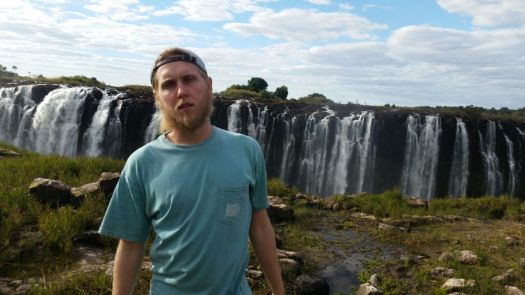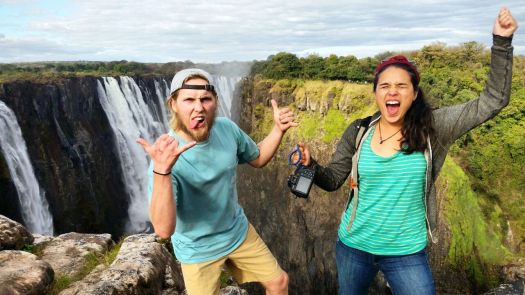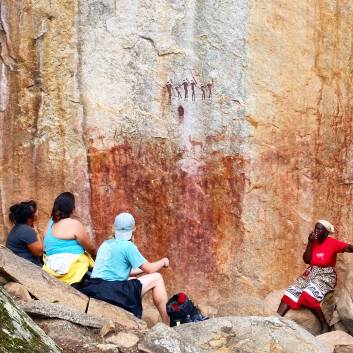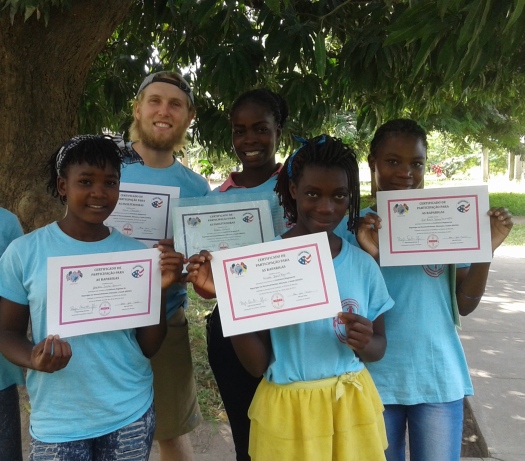August 28, 2018
In my hands, I hold an envelope with the instructions, “Open when you’re on the plane.” While I assume this letter is intended to be opened when aboard my flight to Mozambique, I, admittedly, open it in the air between Atlanta and Philadelphia. Contained inside is a letter written in green ink with the following quote:
“We are torn between nostalgia for the familiar and an urge for the foreign and strange. As often as not, we are homesick for the places we have never known.”
– Carson McCullers
This quote marks the beginning of my Peace Corps journey, and torn is the perfect word to describe my current situation. I feel pulled in two directions, split somewhere in the middle, but not yet fully separated – clinging to the lingering connection to both sides. Knowing that any resistance will deepen the chasm and that this resistance is inevitable. Understanding that torn will eventually give way to separate pieces altogether.
So, here I stand, 2 years after the first time I read that letter, and there is, indeed, a new piece of me – a lot is different.
My familiar looks different. Familiar is Portuglish, dinners with my host family, “servido”, coloring with preschoolers, “ja passou”, singing in languages I barely understand, traversing treacherous dirt roads, Thursday nights at Mae Zina’s, the best mangoes… EVER, overcrowded classrooms, “passear”-ing, Sunday afternoon sunsets at the beach, and a never ending stream of “com licenca”. I am thankful to have been a part of this culture for the time I was given.
The America I will return to is different. In addition to all of the political things that happened (are happening), my home changed. I’ve lived vicariously through a cellphone screen as my loved ones carried on without me. Some of my friends and family have new spouses I’ve never met, new kids I’ve never seen, and new homes I’ve never visited. Truly, I’m homesick for a place I don’t know anymore.
I am different. I am grateful for the beautiful moments of growth Pebane has given me. However, I owe much credit to the difficult times, which catalyzed my bigger changes. After December last year, I remember questioning whether finishing my service was worth it. I was struggling with admitting to myself that I had lost my joy. Emerging from the other side, I’m thankful I found the strength to be brave, and that I (alongside the other people supporting me) pushed through that challenging time. To quote my friend Paige’s blog, “I like to think of these transformative phases as metamorphoses but “metamorphosis” is too pretty a word. Molting seems more fitting.” I had to work things out with myself and with Pebane. I needed the closure. I found I could be happy here again. I found I could be happy again.
Ready or not, my time in Pebane is drawing to a close. As I re-read things from my first days here, reflect on where I was then, and evaluate where I am now, my conclusion is that my heart feels torn again. This time, however, torn doesn’t feel as scary. I embrace it as a blessing. I am fortunate to love many wonderful people, to have knit parts of our stories together, and to have ties across our Earth.
As I alluded to earlier, my heart eventually did break into separate pieces. A piece of it holds Pebane and this Peace Corps experience, a piece contains Birmingham, and a piece has my family and hometown. But, I’ve realized torn doesn’t mean irreparable; my heart’s pieces can be patched together with their lessons woven into the fabric of my being. This “heart”y stitchwork is evidence to my adventures, my mistakes, my recovery, and stretching beyond my limits. Though its already bursting at the seams, my heart has resolved to keep growing. To keep opening itself up to people. To keep tearing.
And here is the 2 year Q&A followed by some pictures throughout the year. Enjoy!
- Can you taste the milkshakes yet?
- I wish.
- What has been your favorite memory these past two years? (I’ll let you do your top 3)
- Watching Ari play in a national music festival at Dia de Zalala!
- Going to eSwatini for Bushfire!
- I was thankful to have people come visit me in Pebane!
- Climbing Mount Namuli!
- The second round of political exile was also a good time!
- What do you think will be the hardest to adjust to when you get back? What are you most scared about? Do you think it will be easy to adjust to life in the U.S.?
- All great questions. No. I don’t think it will be super easy to readjust. But, I’m willing to work on it if you guys are willing to help me out.
- Truthfully, I think it is going to be hard adjusting to a rigid, jam packed, American-style schedule. Friends back at home tell me that they have to plan their social activities with their best friends months in advance AND they only live 15 minutes apart. Here, my best PCV friends and I live at least 6 HOURS apart and we still see each other once a month.
- Americans are crazy. I know that I’ll be crazy too after a little while there. But, that transition period is going to be a bit strange.
- If you had no barriers and unlimited resources to do 5 things before you left, what would you do?
- I would make it to every province. Mozambique has very different biospheres, and I’m sad I won’t be able to see a bit of each part of the country.
- Take my host family on a family vacation. I don’t think it matters where we go, but I think it would be fun to travel with them.
- Build a road connecting Pebane to the paved road. The lack of that road has been the bane of my existence. If that road existed, there would be such better access to resources for Pebane.
- Climb the Pebane lighthouse. It’s been on my bucket list for a while, and I just haven’t met the right person to unlock it for me.
- Become fluent in Moniga. I really wish this was possible. I’m sad everyday that I can’t speak exclusively in this language.
- What are you most looking forward to (most excited about) upon your arrival to the states?
- Milkshakes. 2. Paved roads…. Okay maybe my mom’s mashed potatoes. That could be a 2 way tie. 3. Friends and family.
- I know, I know… Priorities. 😉
- What has been the biggest life lesson you’ve learned from this?
- I think it’s a life lesson I am continuing learning with each human interaction, but that each person is a whole individual. Everyone has their strengths and weaknesses. Their beauties and flaws. And how to try to bring out the best in each person.
- Do you still know all of D Se Dance? Can you still do a backflip?
- I’m offended you asked either of these questions, Kelly.
- And Maybe. (haven’t actually tried either in a while.)
- Would you do it again? (If you could re-do this experience, would you?) Would you advise others to do it?
- I would definitely do it again. I would advise others to consider it. It’s a commitment. It’s hard. Those two things should not be taken lightly when deciding whether to join or not.
- What is the first meal you want back in the US? (What will be the first thing you eat when you come back?)
- It really is just gonna depend on which I see first: my mother with the Tupperware full of mashed potatoes (that I have previously instructed her to bring) or the Chic-fil-a in the Atlanta airport.
- I know what you’re thinking… “the trepidation is enticing.
- What are your plans now? What are you planning to do from November til Med school?
- First and foremost, I’m going to try to visit a ton of people. In these visits, I plan to be extra trifling to make up for my 2 year absence.
- After that, I have a couple potential plans, but we will see what actually happens.
- I really want to go to the big American music festivals. Coachella, Bonaroo, Hangout, etc.
- I want to make a road trip up the west coast.
- I want to visit New Zealand and Portugal with a friend
- I’m thinking about being the cool high school substitute teacher that everyone looks forward to having.
- I might be a temp in Birmingham.
- What was the absolute best part about the experience?
- I think living outside of America and getting a better understanding of another way of life as well as my own culture. It’s a big, big world out there, and I’m glad to have some life experience outside of Alabama.
- Reflecting to when you were little and you asked if you could change your going to sleep time (a.k.a a bedtime, mother) and we compromised and made a deal that said as long as you got up with a smile on your face and got yourself ready every morning for school you could go to bed whenever you wanted (meaning what hour), how did this bargaining help or hinder your Peace Corps decision/service?
- As this unashamedly leading question is alluding to, all that I ever do should be ultimately credited to my mothers’ hard work, dedication, and, most importantly, her parental insight.
- So, yes, mother. I am thankful for everything you have done for me. And, I would never amount to anything without you.
- This statement really is true, but I’m saying it with just a smidge of sarcasm to highlight the outrageousness of this question on this platform.
- That being said, let’s all take a quick moment to call our caretakers and show them a little love!
- P.S. I love you mom! Please don’t poison the mashed potatoes.
- So, yes, mother. I am thankful for everything you have done for me. And, I would never amount to anything without you.
- As this unashamedly leading question is alluding to, all that I ever do should be ultimately credited to my mothers’ hard work, dedication, and, most importantly, her parental insight.
- What place do you plan on visiting first when you get back?
- I haven’t decided but either the west coast, New Zealand, or Portugal.
- Do you think there will ever be an opportunity that you will utilize any event that occurred in your last 30 months? If yes, please elaborate.
- I do think I will be able to utilize some things I learned here. For starters, anytime there is a Portuguese speaker, I could chat with them.
- I have gotten pretty good at being stranded on the side of the road. So, if that ever happens, hit me up for some fun roadside activities such as “boleia” ball, weaving grass crowns, and pioneering the hitchhike version of the Keke challenge.
- What is one thing you did in Pebane that you will continue doing in the states?
- I started cooking here. I definitely want to continue that when I get back to the States, so I can get better.
- What will you miss most about Mozambique when you return? What won’t you miss?
- What will I miss most: Definitely my host family.
- Other things I will miss:
- my preschoolers
- having lunch with Ari in our backyard before afternoon classes
- meeting so many cool international travelers
- the lack of toxic masculinity
- all the fresh fruits and vegetables
- my JUNTOS and English Theater kids
- jeans being classified as business professional
- What won’t I miss: Never blending in. That hasn’t changed.
- Hitchhiking / being stranded on the road
- The Pebane Chapa (the bus that takes me on the Pebane dirt road)
- Hot tin roofs
- Will you ever return for a visit to Mozambique?
- I hope so.
- Will you try to stay in touch with your host family, any friends you made, or any students? How will you do this?
- I definitely will. Nicolsee a.k.a Nick’s da Nicks a.k.a ProNicolseeWild is a facebook guru, so I can stay in touch with him. Also, whatsapp is a great tool for this.
- What will you always remember about your service? What do you think you’ll forget?
- Truthfully, I don’t know. I think that is a year after Peace Corps reflection question. But, that seems like a cop out answer, so I’ll try to answer those.
- I think, overall, my memory will be full of moments reminding me how easygoing life is here. How you always have time to stop and talk with your friends or eat a snack with them.
- I imagine the visceral reaction to travelling will fade. I will always have the stories but the memories of hopelessness while trying to wave down your next ride will probably be gone.
- What type of people do you think should NOT apply to the Peace Corps?
- First, I believe that there could be a place for each type of person in the Peace Corps. Since all of the people in Mozambique are complex with their own unique personalities. I know that each type of person could connect with different types of people.
- But, it should be know that there will be many frustrations, that you aren’t here to save anyone, and that there could be some pretty low moments coupled with isolation.
- In other words, I believe that anyone can do the Peace Corps if they are up for the challenge. But, it’s also okay to not be up for the challenge. It’s not for everyone.
- What do you think your time of service has changed your perspective on the most?
- My privilege. I used to really pride myself on getting to where I am today despite coming from some humble beginnings. But, being born as a white male in America has given me so much opportunity that I never realized.
- Do you think being White made it harder or easier to be accepted into the Peace Corps and into your specific village?
- This is a tricky answer. I think it is challenging for all foreigners trying to come to Pebane, even Mozambicans not from Pebane. However, was it “harder” because I’m white? I don’t think so. I would bet that it was easier. While I’m trying not to deny anyone else’s experiences, I’m confident that, out of the possible foreigners coming into Pebane, a white foreigner would have the easiest time being accepted.
- That being said, I know that I have never been discriminated against because of my skin color like I was here. I had a lot of stereotypes assigned to me because of how I looked, which made some situations difficult to navigate. For example, many people assumed that since I was white, I was a fountain of money. That I had connections to all kinds of businessman. Sometimes, they thought I was here only to try to take advantage of them and their resources, as previous people who looked like me have done in the past. None of these things were easy. I didn’t feel good being reduced to only my race, but I don’t think my experience was more difficult because of it.
- I believe that this is a really worthwhile topic of discussion that has many viewpoints that should be considered. So, I am including a link to blog posts by my friend Ashia, a fellow Moz (R)PCV, that I believe can provide another really good perspective on the matter.
- Real Talk About How It Feels To Be A Black Peace Corps Volunteer Serving In An African Country
- Real Talk About How It Feels To Be A Black Peace Corps Volunteer in an African Country, Pt.2
- Do you feel safer in your village because you are a man?
- I do think I feel safer in my village because I am a man. Please review either of the above blog posts or my previous post here.
- Did being in the Peace Corps make you more or less excited for medical school?
- More excited. If you see my previous blog post. I knew that medical school was always right for me, I just wanted some more life experience first.
- Will you hang out with me when you come back?
- And I quote from my last reflection, “Yes, Sid. ;)”
- Would you rather fight 50 duck-sized horses or 1 horse-sized duck?
- Hmmmmmmm… My instinct is to say 1 horse sized duck. But ducks are hella mean….
- Is there ready available bread or hay? …No? …That’s cheating?
- Okay, well then yea I’m gonna stick with the 1 horse- sized duck. Honestly, just hoping I can outrun it.
- Have you discovered anything new about yourself from this experience?
- I can be much more introverted than I thought possible.
- I have a not so nice side that comes out when provoked.
- While I have loved traveling, I know that I’ll want to have roots someday.
- I know that I still get scared especially in a foreign language.
- I know that I can make it two years in the Peace Corps. And that is saying something.
- Have you had any experience with dating during this experience? Any romantic plans following your return?
- None whatsoever. Truthfully, I ended a serious relationship right before joining the Peace Corps because I wanted to take this time to focus on myself and who I was. So, I didn’t really want to be involved with anyone while serving.
- Following the return? Also, not rushing into anything. I’m starting medical school in August, which means I might only be in Alabama for a couple months. So, maybe? If it happens, it happens. But, I don’t know that I’ll be looking for anything too quickly after coming back.
- How has your fashion sense evolved from this experience?
- Great question. On one side, I think I have opened up to so many new styles and ways of looking at things. On the other hand, I still very much like to wear gym shorts.
- Gym shorts usually win.
- When you take your first few steps back on US soil, what is the first thing you are going to do?
- I’m going to Disney World!
- But really though, hug whoever is picking me up from the airport. Then, beeline to Chic-fil-a!
- Did your ENO survive the whole trip?
- It sure did! Thank you for your hammock concern!
Reference Back to Question 8:
Can confirm. Still know De Se Dance.
Also, after further review, to scared to try a backflip so far away from medical attention. I will get back to you with the answer.
Bushfire was amazing!

Visiting the eMoniga river.
Hiking the tea fields of Gurue with some of my cohort
Tried to explore Gile National Reserve about 8 hours from my site.

Nicolsee helped Ari and I paint a World Map at our school.

Loving the Nampula Sunsets
Before and after our haircuts in South Africa.
A day hanging out with our preschool kids and World Education!

What has become a classic John and Kaari Travel picture. Featuring the union of the Atlantic and Arctic Oceans.
Pebane has participated in the REDES and JUNTOS provincial workshops. We have also had 2 Grassroots soccer interventions.
Just host brothers showing off our Birthday Shirts
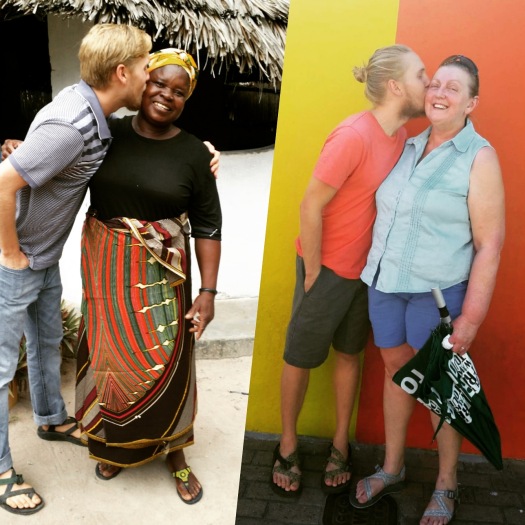
My sweet mommas!
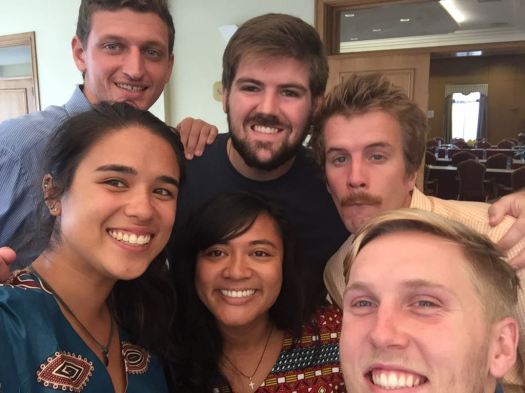
KAJDAJ taking on year 2!

Political Exile Round 2: Bowling edition.

When you make your friends match you

The Pebane Power PCVs
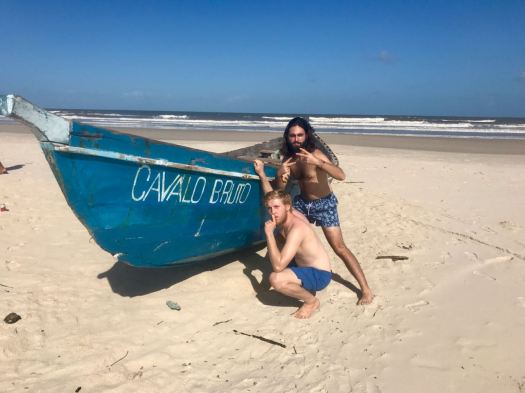

Showing off my beach
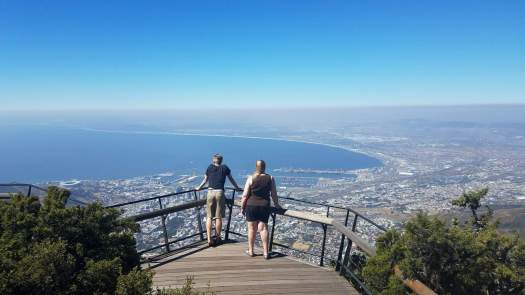
Mom and I looking out over Cape Town. Not moments afterwards, she gave me a wedgie…

Making Smores

Not going to lie, I posted this mostly because of Kaari’s face, but also because ya’know… CHRIMMUS!!!

My host family proudly boasting their new UAB Parents’ Association shirts. They have 2 Blazer children!
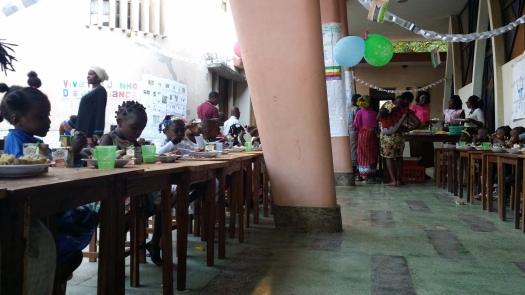

Celebrating June 1, Children’s day with our preschoolers.

Essence and I occasionally go to the beach and we occasionally take good pictures.

Sometimes you breakdown on the side of the road and have to start playing cards on the drain..
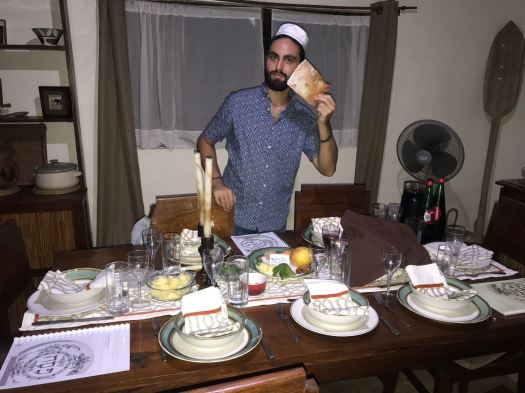
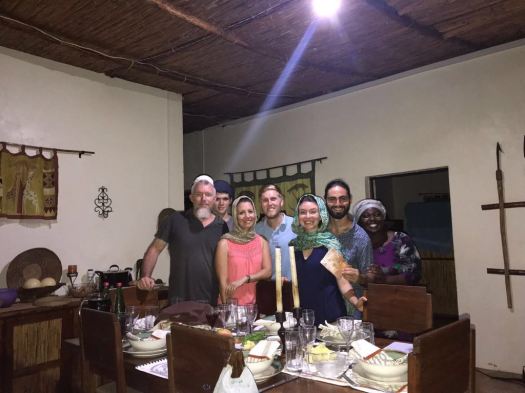
Passover Round 2 with Phil, Elin, Elias and Callie.

It’s been real Pebane.


















































 At the bottom of the mountain when we were all clean again.
At the bottom of the mountain when we were all clean again.


